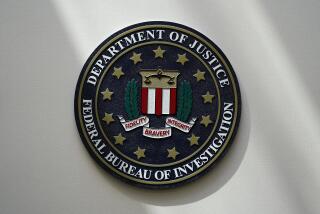Russian diplomat’s career spanned Cold War and Gulf War
- Share via
Veteran diplomat Yuli Vorontsov, who served the Soviet Union and Russia as ambassador to Afghanistan and the United States in a career spanning the Cold War and Gulf War, has died. He was 78.
Vorontsov died Wednesday in Moscow, the Foreign Ministry said, ending a “glorious diplomatic path” that also included stints as ambassador to the United Nations, France and India, and as the U.N. envoy overseeing the return or repatriation of the remains of Kuwaitis and others missing after the 1990-91 Gulf War, a job he held until his death.
“Yuli Vorontsov’s diplomatic talent shone in everything he was entrusted with,” the ministry said.
Born in Leningrad on Oct. 7, 1929, Vorontsov graduated in 1952 from the main Soviet diplomatic academy, the Moscow State Institute of Foreign Relations.
He rose through the diplomatic ranks, from lowly assistant to the post of deputy foreign minister under President Mikhail Gorbachev.
Vorontsov played roles in some of the watershed events of the Cold War, from arms talks with Washington to the Soviet invasion of Afghanistan, where he was ambassador when Soviet troops withdrew in 1988-89.
Before his 1988 Afghan appointment, Vorontsov was ambassador to India and France and then chief negotiator in arms control talks with the United States.
He was appointed Soviet representative to the United Nations in 1990 and became Russia’s ambassador after the Soviet Union collapsed a year later, serving at the world body until President Boris Yeltsin named him ambassador to Washington in 1994.
In 2000, Vorontsov returned to the United Nations as special U.N. envoy in charge of coordinating international efforts aimed at the repatriation or return of all Kuwaiti and third-country nationals missing after the Gulf War, as well as the return of Kuwaiti property.
A dapper dresser who also spoke English and French fluently, Vorontsov was viewed as a capable diplomat who avoided the turmoil of Moscow’s political landscape.
“He’s one of the best Russian professionals,” Andrei Kortunov, a foreign policy chief at Moscow’s USA-Canada Institute, told the Washington Post in 1994. “His record is quite impressive, and probably his most important accomplishment was to manage the withdrawal from Afghanistan, where he did a superb job and one that is still underestimated.”
Vorontsov’s death came just a few days after he returned from a mission to Kuwait, said Marie Okabe, deputy spokeswoman for U.N. Secretary-General Ban Ki-moon.
“Throughout his career, he showed dedication and tireless effort,” Okabe said. “He enjoyed the deep respect of all his colleagues.”
More to Read
Sign up for Essential California
The most important California stories and recommendations in your inbox every morning.
You may occasionally receive promotional content from the Los Angeles Times.













